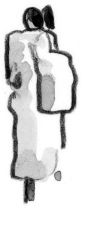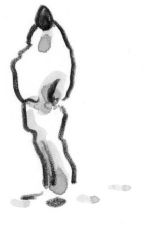Ridiculous/Hilarious/Terrible/Cool (12 page)
Read Ridiculous/Hilarious/Terrible/Cool Online
Authors: Elisha Cooper

The other two girls egg her on: “Preach on it!
Preach
on it!”
Preach
on it!”
The sermon reaches its crescendo, the girl flapping one hand in front of her face she's getting so heated. Anthony retreats even farther into his green turtle shell, and just when it appears he can not disappear any farther, the girl lowers her voice and leans toward him and says, not unkindly, “Am I right? Am I
right?
You stupid in love.”
right?
You stupid in love.”
Anthony nods and says in a barely audible whisper,
“My opinions on the situation are blinded.”
“My opinions on the situation are blinded.”
Aisha shuffles through the school's front door, her jacket pulled tight around her like a sleeping bag. She drives to school except when it snows (her parents don't let her drive in the snow). This morning the streets were clear, but she had to park blocks away from school, and then she forgot her mittens. Even though she was holding a hot mug of Pakistani tea, her hands nearly froze.

Aisha walks past the Christmas tree that has just been erected in the atrium (plastic branches stuck in a metal pole with an orange and blue number 34 Walter Payton football patch on top), and heads to her locker. She doesn't put her coat inside.
The cold weather has been giving Aisha a headache. It's a cold she's never experienced before. It's making her eyes water. She keeps a scarf around her neck all the time. Her hands are always chilled.
Later that morning Aisha is still trying to warm her hands. She's running around the library, though not by choice. She's making copies because one of the colleges she's applying to lost her application. Her process has been complex, especially getting her school in Cairo to send her transcript to colleges in the States. Ten minutes later Aisha flops into a seat by the window, throws her feet up, and starts grumbling.
“It's the
waiting
that's annoying. I just want to get in
somewhere.
Then I'll be happy.”
waiting
that's annoying. I just want to get in
somewhere.
Then I'll be happy.”
She starts fanning her flushed face with the ends of her long
khandi
scarf.
khandi
scarf.
Aisha's Pakistani grandfather is visiting. He doesn't like Chicago. Too crowded, he says. He misses the peace and quiet of Karachi. It's also too cold in Chicago. When he walks around the Shaikhs' neighborhood he bundles in a long coat, a woolly hat, and dark sunglasses to block the wind.
“He looks like a gangster!” Aisha says, covering her laugh with her scarf.
After his walk, Aisha's grandfather surfs the Web on the computer that Aisha set up for him. He'll fly back to Pakistan before the holidays.
As a Muslim, Aisha finds Christmas odd. All the trees, the Santa hats, the candy canes. For her, the most significant thing about Christmas is that chocolate goes on sale. Her Columbian grandmother is Christian, however, and the family is driving down to Florida to surprise her (the grandmother lives next to the house in Palm Coast that the family has kept during their travels). The drive will be long. Six Shaikhs, one Oldsmobile. Aisha's not looking forward to it, though she is looking forward to the warm weather.
After school outside the front door, students wobble from side to side, hands shoved deep in the pockets of their puffy black jackets, shoulders knocking. They look like penguins huddling against a storm. Once the white-haired polar bear of a police officer chases them off, they waddle to the bus or to cars or to the "L,” where an advertisement for Aruba has just gone up over the tracks, a splash of pink against the steel gray of winter.
That night it snows, the first snow of the year. A blanket of white covers Payton. In the morning, maintenance workers push blowers and spray salt and mop the puddles of slush that students bring inside with their squeaking boots.

Boots present a fashion challenge to girls. Wear boots over jeans, or tuck them under? Put boots in lockers and change into flats? Sacrifice warmth for style, style for warmth?
Of course, fashion does not matter as much if you are good-looking, and Anais Blake is good-looking enough to wear ugly boots. Anais is sitting in the second-floor atrium, looking out the window and eating a banana. Her boots are large and brown and embroidered with flowers, which make her feet look like pickup trucks with frilly detailing. But if the goal is to warm and protect her feet, they work.
After Anais hurt her ankle, she went to one physical therapist and then another. Neither knew what was wrong. Finally, a third therapist identified the injury: Her leaping had cramped her calf and pulled a nerve and thrown the rotation of her hips out of whack. The therapist re-rotated her hips, and Anais took
 loads of painkillers and the pain subsided, though not in time for her Indiana audition. Her mother called and told them Anais was sick (it is never good for a dancer to admit being injury-prone, and Anais says she is not). She was able to postpone her audition until the winter.
loads of painkillers and the pain subsided, though not in time for her Indiana audition. Her mother called and told them Anais was sick (it is never good for a dancer to admit being injury-prone, and Anais says she is not). She was able to postpone her audition until the winter.

Deep down, Anais is relieved that she didn't have to perform. She can't shake the feeling that hurting her ankle started in some way in her head. A few years ago, Anais competed in Irish dance competitions. She did well. Then she started falling. Inexplicable falls where she, the ablest dancer on the floor, just tipped over. She went to a sports psychologist to try to figure out why. The psychologist helped her see how over-thinking can be dangerous in dance. Dancing is mental, but it can become too mental. Knowing that, however, and doing something about it, can be different things.
Once the swelling in her ankle subsided, Anais was able to dance. Over the weekend she performed
The Nutcracker
with her dance troupe, the Civic Ballet of Chicago. Anais was a marzipan and wore an elaborate orange tutu. She danced in all five performances.
The Nutcracker
with her dance troupe, the Civic Ballet of Chicago. Anais was a marzipan and wore an elaborate orange tutu. She danced in all five performances.
When she came to school Monday she was worn down, a physical and emotional wreck. She went home early.
Anais lives with her family in a yellow clapboard house with white trim on a quiet street on the North Side. The nearest cross street is Grace Street. Anais has a canopy bed in her room, and that's where she spent Tuesday. She slept the whole day. On her bedroom wall is a poster of a leaping Cuban dancer, another of Baryshnikov. There's also a photograph of Anais dancing with a member of the Joffrey Ballet named Calvin Kitten. Anais is looking at Calvin and beaming. It's one of her favorite photos.
That night Anais could not sleep, so she read her sister's
Cosmo Girl
and
Teen Vogue
. Then she did sit-ups. Even on a day when she does not dance, it's hard for her not to work out. Hard not to do
something
. Over break, Anais is flying to Miami to dance with the Cuban Classical Ballet.
Cosmo Girl
and
Teen Vogue
. Then she did sit-ups. Even on a day when she does not dance, it's hard for her not to work out. Hard not to do
something
. Over break, Anais is flying to Miami to dance with the Cuban Classical Ballet.
A tackle football game is stirring up the snow-covered field next to the high school. Eight boys in boots and puffy jackets.
 Insulting each other, squinting in the snow's glare, throwing a snow-caked ball. No tackles are made. When someone reaches the end zone he spikes the ball in front of the person he ran past.
Insulting each other, squinting in the snow's glare, throwing a snow-caked ball. No tackles are made. When someone reaches the end zone he spikes the ball in front of the person he ran past.

“Fourteen to seven,
nigga!
”
nigga!
”
Every sentence is preceded or followed by “nigga,” the epithet tossed around more casually and efficiently than the ball (with the exception of the one white player, who doesn't say anything). The game deteriorates.

“This is
horrible
. We goin'
home!
” It is. They don't Finally a boy is tackled and the other boys pile on top.
horrible
. We goin'
home!
” It is. They don't Finally a boy is tackled and the other boys pile on top.
Maya's play went on, the assistant principal's concerns notwithstanding. And while the other student-directed plays were so dull one woman in the audience started snoringâa full-on esophagus-rattle that had the person next to her poking her in the ribsâMaya's play was fine. Her actors came through. When the lights in the third-floor theater/classroom came on,
Maya skipped up to the stage with the other directors and bowed, a big smile on her face.
She's had other reasons for smiling.
Every day, Maya walks home after school. It's one of her favorite parts of the day. After leaving Payton she heads downtown, slowing to look in boutiques or coffee shops or the window display of Barney's New York, and if she's had a bad day, it peels away and by the time she takes the elevator to her apartment on the twenty-sixth floor, she is calm.
When she walked home last Friday, she wasn't calm. She began checking her e-mail every half hour. At eight o'clock the one she'd been waiting for popped up. As she read the line welcoming her to the Stanford class of 2010 she was almost sick. She had to read it again. Then she started jumping around her room. Of the twenty students in the Payton senior class who applied early to Stanford, Maya was the only one accepted.
Maya is also happy because it's the holidays. Christmas is big in the Boudreau family. Maya has been knitting scarves for her sisters, one blue and one purple. She's looking forward to all the festivities. She's also looking forward to hanging out with Anais, and with Ben&Andy. Right now, she's on air, as if nothing in the world could break this bubble, as if this bubble could only expand.
Other books
8 Plus 1 by Robert Cormier
Hangover Square by Patrick Hamilton
The Serpent on the Crown by Elizabeth Peters
Dead in the Water (A Cal Murphy Thriller Book 4) by Jack Patterson
Trouble Comes in Threes by M.A. Church
Lights Out by Stopforth, W.J.
Obsession - Girl Abducted by Claire Thompson
Men of No Property by Dorothy Salisbury Davis
The Lie of You: I Will Have What Is Mine by Lythell, Jane
Hannah Coulter by Wendell Berry